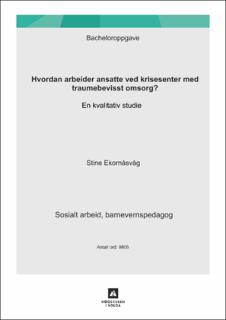| dc.contributor.author | Ekornåsvåg, Stine | |
| dc.date.accessioned | 2021-07-05T10:57:46Z | |
| dc.date.available | 2021-07-05T10:57:46Z | |
| dc.date.issued | 2021 | |
| dc.identifier.uri | https://hdl.handle.net/11250/2763369 | |
| dc.description.abstract | Denne oppgaven har som formål å avdekke hvordan ansatte ved krisesenter arbeider traumebevisst med barn og unge. Studien undersøker hvorvidt de ansatte bruker de tre grunnpilarene trygghet, relasjon og følelsesregulering, inn i arbeidet og hva deres refleksjoner og tanker rundt det aktuelle temaet er. For å sette spørsmålstegn ved det forebyggende arbeidet med barn og unge, ble følgende problemstilling utarbeidet: • Hvordan arbeider ansatte ved krisesenter med traumebevisst omsorg?
På bakgrunn av problemstillingen tar kunnskapsgrunnlaget dermed utgangspunkt i de tre grunnpilarene i traumebevisst omsorg samt toleransevindu og den tredelte hjernen. Jeg avslutter kunnskapskapittelet med tverrprofesjonelt og tverretatlig samarbeid. I denne rapporten ble tre informanter intervjuet i form av den kvalitative metoden, dybdeintervju. Intervjuene var individuelle og gjennomført via Microsoft Teams. Det ble samlet inn 163 minutter med data som ble analysert og transkribert i dataprogrammet MAXQDA.
For å kunne besvare studiens problemstilling ble tre følgende forskningsspørsmål utformet: • Hvordan arbeider ansatte ved krisesenter direkte mot barnet med TBO? • Hvordan arbeider ansatte ved krisesenter indirekte mot barnet gjennom den foresatte med TBO? • Hvordan samarbeider ansatte ved krisesenter tverrprofesjonelt og tverretatlig med TBO?
Funnet viser at de forskningsspørsmålene har en sammenheng i arbeidet med barn og unge. Ansatte ved krisesenteret benytter i stor grad de tre grunnpilarene trygghet, relasjon og følelsesregulering, men det viste seg at det var vanskelig å skille foreldrenes påvirkning i arbeidet direkte og indirekte mot barnet. Det tverrprofesjonelle samarbeidet er god og nyttig, men påpekes at det likevel alltid kan bli bedre. Om det tverretatlige samarbeidet viser det både preg av viktige samarbeidspartnere og hvordan uvitenhet om vold fra andre instanser hindrer et bedre tilbud til barn og unge. | en_US |
| dc.description.abstract | Abstract
The purpose of this thesis is to uncover how employees at the “krisesenter” work traumaconsciously with children and young people. The purpose of the study examines whether the employees use the three pillars of security, connections and emotion regulation into the work and their reflections and thoughts on the relevant topic. To question the preventive work with children and young people, the following problem was prepared: • How do staff at the “krisesenter” work with trauma-informed care?
Based on the problem, the knowledge is thus based on the three basic pillars of traumaconscious care as well as the window of tolerance and the three-part brain. I end the chapter with interprofessional and interagency collaboration. In this report, three informants were interviewed in the form of the qualitative method, in-depth interview. The interviews were individual and conducted via Microsoft Teams. 163 minutes of data were collected, analyzed, and transcribed in the MAXQDA computer program.
To answer the study's problem, three following research questions were designed: • How do employees at the “krisesenter” work directly with the child with traumainformed care? • How do employees at the “krisesenter” work indirectly against the child through the parent with trauma-informed care? • How do employees at the “krisesenter” cooperate interprofessional and interagency with trauma-informed care?
The results show that the three research questions have a connection in the work with children and young people. Employees at the “krisesenter” highly use the three pillars of security, connections, and emotion regulation, but it turned out that it was difficult to separate the parents' influence in the work directly and indirectly towards the child. The interprofessional collaboration is good and useful, but it is pointed out that it can still be improved. The interagency cooperation shows influence from key partners and how ignorance regarding cases of violence prevents a better offer for children and young people. | en_US |
| dc.language.iso | nob | en_US |
| dc.publisher | Høgskulen i Volda | en_US |
| dc.subject | traumebevisst omsorg | en_US |
| dc.subject | krisesenter | en_US |
| dc.subject | barn | en_US |
| dc.subject | forebygging | en_US |
| dc.subject | TBO | en_US |
| dc.subject | tverrprofesjonelt samarbeid | en_US |
| dc.title | Hvordan arbeider ansatte ved krisesenter med traumebevisst omsorg? En kvalitativ studie | en_US |
| dc.type | Bachelor thesis | en_US |
| dc.source.pagenumber | 43 | en_US |
